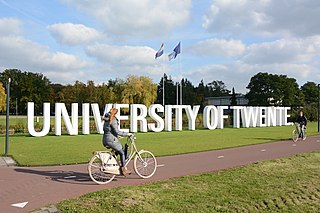
The University of Twente is a public technical university located in Enschede, Netherlands. The university has been placed in the top 170 universities in the world by multiple central ranking tables. In addition, the UT was ranked the best technical university in The Netherlands by Keuzegids Universiteiten, the most significant national university ranking. The UT collaborates with Delft University of Technology, Eindhoven University of Technology and the Wageningen University and Research Centre under the umbrella of 4TU and is also a partner in the European Consortium of Innovative Universities (ECIU).

Robert Anthony Kowalski is an American-British logician and computer scientist, whose research is concerned with developing both human-oriented models of computing and computational models of human thinking. He has spent most of his career in the United Kingdom.

Hendrik Pieter (Henk) Barendregt is a Dutch logician, known for his work in lambda calculus and type theory.

Michael Paul Fourman FBCS FRSE is Professor of Computer Systems at the University of Edinburgh in Scotland, UK, and was Head of the School of Informatics from 2001 to 2009.
Johannes Aldert "Jan" Bergstra is a Dutch computer scientist. His work has focussed on logic and the theoretical foundations of software engineering, especially on formal methods for system design. He is best known as an expert on algebraic methods for the specification of data and computational processes in general.
Astrolinguistics is a field of linguistics connected with the search for extraterrestrial intelligence (SETI).

Moshe Ya'akov Vardi is an Israeli mathematician and computer scientist. He is the Karen Ostrum George Distinguished Service Professor in Computational Engineering at Rice University, United States. and a faculty advisor for the Ken Kennedy Institute. His interests focus on applications of logic to computer science, including database theory, finite model theory, knowledge of multi-agent systems, computer-aided verification and reasoning, and teaching logic across the curriculum. He is an expert in model checking, constraint satisfaction and database theory, common knowledge (logic), and theoretical computer science.
Jan van Leeuwen is a Dutch computer scientist and emeritus professor of computer science at the Department of Information and Computing Sciences at Utrecht University.

Naomi Ellemers is a distinguished professor of social psychology at Utrecht University since September 2015.
Franciscus Petrus Maria (Frank) Dignum is a Dutch computer scientist. He is currently a Professor of Socially-Aware AI at Umeå University and an associate professor at the Department of Information and Computing Sciences of the Utrecht University. Dignum is best known from his work on software agents, multi-agent systems and fundamental aspects of social agents.

Tjitske Nienke"Cisca"Wijmenga is a Dutch professor of Human Genetics at the University of Groningen and the University Medical Center Groningen. She has been Rector Magnificus of the University since September 2019.

Sara Anna van de Geer is a Dutch statistician who is a professor in the department of mathematics at ETH Zurich. She is the daughter of psychologist John P. van de Geer.

Johannes Alphonsus Marie "Johan" Bleeker is a Dutch space research and technology scientist. He was director of the Netherlands Institute for Space Research from 1983 to 2003. He was involved in the setting up of the Horizon 2000 and Horizon 2000+ long term space science programs of the European Space Agency.
Victor Witold Marek, formerly Wiktor Witold Marek known as Witek Marek is a Polish mathematician and computer scientist working in the fields of theoretical computer science and mathematical logic.

Hendrik Jacob (Jaap) van den Herik is a Dutch computer scientist, and professor at the University of Leiden, known for his contribution in the fields of computer chess and artificial intelligence.

Marileen Dogterom is a Dutch biophysicist and professor at the Kavli Institute of Nanoscience at Delft University of Technology. She published in Science, Cell, and Nature and is notable for her research of the cell cytoskeleton. For this research, she was awarded the 2018 Spinoza Prize.

Maria Virgínia Ferreira de Almeida Júdice Gamito Dignum is a Professor of Computer Science at Umeå University, and an Associated Professor at Delft University of Technology. She leads the Social and Ethical Artificial Intelligence research group. Her research and writing considers responsible AI and the development evaluation of human-agent team work, thereby aligning with Human-Centered Artificial Intelligence themes.
Alice Geraldine Baltina ter Meulen is a Dutch linguist, logician, and philosopher of language whose research topics include genericity in linguistics, intensional logic, generalized quantifiers, discourse representation theory, and the linguistic representation of time. She is a professor emerita at the University of Geneva.
Ans van Kemenade is a Dutch professor of English linguistics at the Radboud University Nijmegen specializing in the history of the English language.
Lambertus Adrianus "Bert" Peletier was a Dutch mathematician. He was a professor of analysis and applied mathematics at Leiden University from 1977 until his retirement in 2002.












